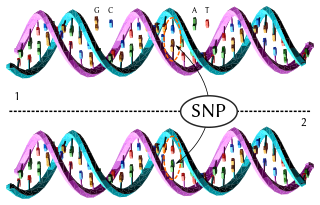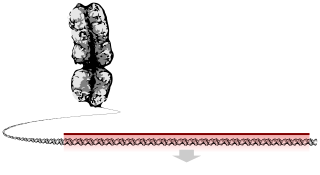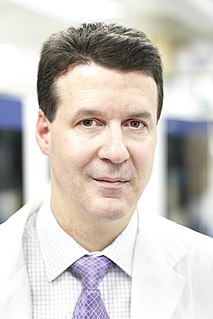
In biology, a mutation is an alteration in the nucleic acid sequence of the genome of an organism, virus, or extrachromosomal DNA. Viral genomes contain either DNA or RNA. Mutations result from errors during DNA or viral replication, mitosis, or meiosis or other types of damage to DNA, which then may undergo error-prone repair, cause an error during other forms of repair, or cause an error during replication. Mutations may also result from insertion or deletion of segments of DNA due to mobile genetic elements.

In genetics, the phenotype is the set of observable characteristics or traits of an organism. The term covers the organism's morphology or physical form and structure, its developmental processes, its biochemical and physiological properties, its behavior, and the products of behavior. An organism's phenotype results from two basic factors: the expression of an organism's genetic code, or its genotype, and the influence of environmental factors. Both factors may interact, further affecting phenotype. When two or more clearly different phenotypes exist in the same population of a species, the species is called polymorphic. A well-documented example of polymorphism is Labrador Retriever coloring; while the coat color depends on many genes, it is clearly seen in the environment as yellow, black, and brown. Richard Dawkins in 1978 and then again in his 1982 book The Extended Phenotype suggested that one can regard bird nests and other built structures such as caddis-fly larva cases and beaver dams as "extended phenotypes".

Population genetics is a subfield of genetics that deals with genetic differences within and between populations, and is a part of evolutionary biology. Studies in this branch of biology examine such phenomena as adaptation, speciation, and population structure.

Genetic variation is the difference in DNA among individuals or the differences between populations. The multiple sources of genetic variation include mutation and genetic recombination. Mutations are the ultimate sources of genetic variation, but other mechanisms, such as sexual reproduction and genetic drift, contribute to it, as well.

In genetics, a single-nucleotide polymorphism is a germline substitution of a single nucleotide at a specific position in the genome. Although certain definitions require the substitution to be present in a sufficiently large fraction of the population, many publications do not apply such a frequency threshold.

William Bateson was an English biologist who was the first person to use the term genetics to describe the study of heredity, and the chief populariser of the ideas of Gregor Mendel following their rediscovery in 1900 by Hugo de Vries and Carl Correns. His 1894 book Materials for the Study of Variation was one of the earliest formulations of the new approach to genetics.

Conservation genetics is an interdisciplinary subfield of population genetics that aims to understand the dynamics of genes in populations principally to avoid extinction. Therefore, it applies genetic methods to the conservation and restoration of biodiversity. Researchers involved in conservation genetics come from a variety of fields including population genetics, molecular ecology, biology, evolutionary biology, and systematics. Genetic diversity is one of the three fundamental levels of biodiversity, so it is directly important in conservation. Genetic variability influences both the health and long-term survival of populations because decreased genetic diversity has been associated with reduced fitness, such as high juvenile mortality, diminished population growth, reduced immunity, and ultimately, higher extinction risk.

The Wellcome Sanger Institute, previously known as The Sanger Centre and Wellcome Trust Sanger Institute, is a non-profit British genomics and genetics research institute, primarily funded by the Wellcome Trust.

In biology, a gene is a basic unit of heredity and a sequence of nucleotides in DNA that encodes the synthesis of a gene product, either RNA or protein.

Human genetic variation is the genetic differences in and among populations. There may be multiple variants of any given gene in the human population (alleles), a situation called polymorphism.

The American Journal of Human Genetics is a monthly peer-reviewed scientific journal in the field of human genetics. It was established in 1948 by the American Society of Human Genetics and covers all aspects of heredity in humans, including the application of genetics in medicine and public policy, as well as the related areas of molecular and cell biology. According to the Journal Citation Reports, the journal has a 2019 impact factor of 10.502. The journal is published by Cell Press an imprint of Elsevier. Bruce R. Korf became the editor-in-chief in the winter of 2017–2018.
The following outline is provided as an overview of and topical guide to genetics:

The 1000 Genomes Project, launched in January 2008, was an international research effort to establish by far the most detailed catalogue of human genetic variation. Scientists planned to sequence the genomes of at least one thousand anonymous participants from a number of different ethnic groups within the following three years, using newly developed technologies which were faster and less expensive. In 2010, the project finished its pilot phase, which was described in detail in a publication in the journal Nature. In 2012, the sequencing of 1092 genomes was announced in a Nature publication. In 2015, two papers in Nature reported results and the completion of the project and opportunities for future research.

Plant genetics is the study of genes, genetic variation, and heredity specifically in plants. It is generally considered a field of biology and botany, but intersects frequently with many other life sciences and is strongly linked with the study of information systems. Plant genetics is similar in many ways to animal genetics but differs in a few key areas.

Stephen Wayne "Steve" Scherer is a Canadian scientist who studies genetic variation in human disease. He obtained his PhD at the University of Toronto under Professor Lap-chee Tsui. Together they founded Canada's first human genome centre, the Centre for Applied Genomics (TCAG) at the Hospital for Sick Children. He continues to serve as director of TCAG, and is also director of the McLaughlin Centre at the University of Toronto Faculty of Medicine.

Peter D. Keightley FRS is Professor of Evolutionary Genetics at the Institute of Evolutionary Biology in School of Biological Sciences at the University of Edinburgh.

Richard Cotton AM was an Australian medical researcher and founder of the Murdoch Institute and the Human Variome Project. Cotton focused on the prevention and treatment of genetic disorders and birth defects.
Genetics Research is an open access, peer-reviewed scientific journal covering all aspects of human and animal genetics, reporting key findings on genomes, genes, mutations and molecular interactions, extending out to developmental, evolutionary, and population genetics as well as ethical, legal and social aspects. It was established in 1960 as Genetical Research, obtaining its current name in 2008. The founding editor-in-chief was Eric C.R. Reeve.

Charles Nohuoma Rotimi is the Director of the Trans-National Institutes of Health (NIH) center for research in genomics and global health. He works to ensure that population genetics include genomes from African populations and founded the African Society of Human Genetics in 2003. Rotimi was instrumental in the launch of the Human Heredity and Health in Africa (H3Africa) with the NIH and the Wellcome Trust. He was elected to the National Academy of Medicine in 2018.
Matthew Edward Hurles is head of human genetics at the Wellcome Sanger Institute and an honorary professor of Human Genetics and Genomics at the University of Cambridge.















